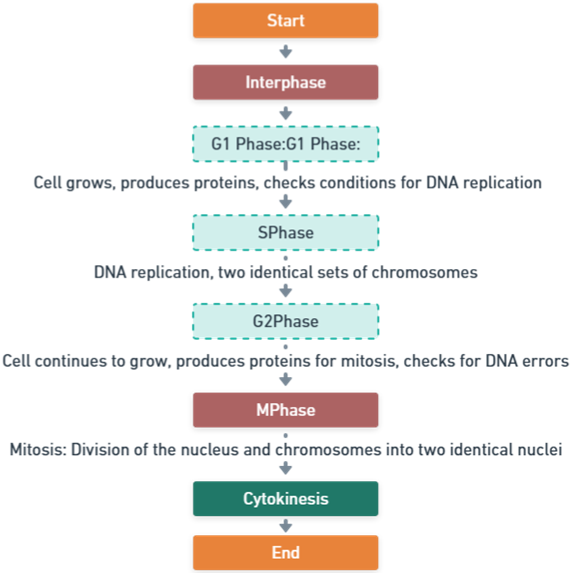- Cell division is a fundamental process in which a parent cell divides into two or more daughter cells.
- It allows for growth, repair, and reproduction in living organisms.
- There are two main types of cell division: mitosis (in eukaryotic cells) and binary fission (in prokaryotic cells).
- Additionally, eukaryotic organisms undergo a specialized form of cell division called meiosis to produce gametes (sperm and egg cells) for sexual reproduction.

Interphase
Interphase is the preparation phase, divided into three stages:
- G1 Phase (Gap 1): The cell grows, produces proteins, and checks conditions for DNA replication.
- S Phase (Synthesis): DNA is replicated, resulting in two identical sets of chromosomes.
- G2 Phase (Gap 2): The cell continues to grow, produces proteins needed for mitosis, and checks for DNA errors.
M Phase (Mitotic Phase)
The M phase involves:
- Mitosis: Division of the nucleus and chromosomes into two identical nuclei.
- Cytokinesis: Division of the cytoplasm, resulting in two separate daughter cells.
This cycle ensures proper cell growth, DNA replication, and division, maintaining healthy cell function.
M Phase (Mitotic Phase) Top of Form of Cell Division
- Cell division is a fundamental process by which a single cell divides into two or more daughter cells.
- This process is essential for growth, development, and repair in living organisms.
- There are two main types of cell division: mitosis and meiosis.
Mitosis
- Mitosis is responsible for the growth and maintenance of tissues.
- It’s how organisms grow and how they replace old or damaged cells.
Process
- Interphase: The cell prepares for division by replicating its DNA, so each daughter cell will have a complete set of chromosomes.
- Prophase: The chromatin condenses into visible chromosomes, and the nuclear membrane begins to disintegrate. Spindle fibers start to form.
- Metaphase: The chromosomes align in the middle of the cell, attached to spindle fibers.
- Anaphase: The chromosomes are pulled apart, with each half moving to opposite sides of the cell.
- Telophase: The chromosomes reach the poles, and a new nuclear membrane forms around each set, creating two nuclei.
- Cytokinesis: The cell’s cytoplasm divides, forming two separate daughter cells, each with an identical set of chromosomes.
- Meiosis
- Meiosis is crucial for sexual reproduction and occurs in germ cells (sperm and eggs).
- It reduces the chromosome number by half, resulting in four genetically diverse daughter cells, each with half the number of chromosomes as the original cell.
Process
- Meiosis I
- Prophase I: Chromosomes condense, and homologous chromosomes pair up, exchanging segments in a process called crossing over.
- Metaphase I: Paired homologous chromosomes line up at the cell’s equator.
- Anaphase I: The homologous chromosomes are pulled apart to opposite sides.
- Telophase I and Cytokinesis: The cell divides into two non-identical daughter cells, each with half the original number of chromosomes.
- Meiosis II
- Prophase II: The two cells prepare for another division.
- Metaphase II: Chromosomes line up at the equator of each cell.
- Anaphase II: Sister chromatids are pulled apart to opposite poles.
- Telophase II and Cytokinesis: Both cells divide, resulting in four non-identical daughter cells, each with half the original chromosome number.
Key Differences Between Mitosis and Meiosis of Cell Division
- Mitosis: Produces two genetically identical daughter cells with the same number of chromosomes as the parent cell.
- Meiosis: Produces four genetically diverse daughter cells with half the chromosome number of the parent cell.
